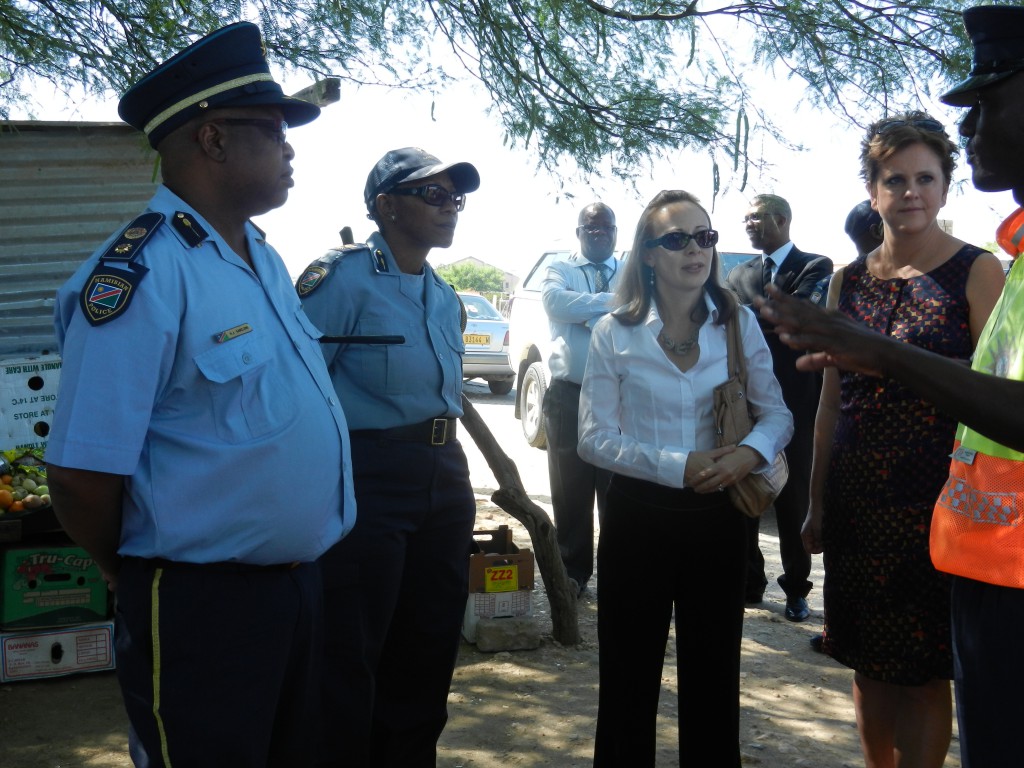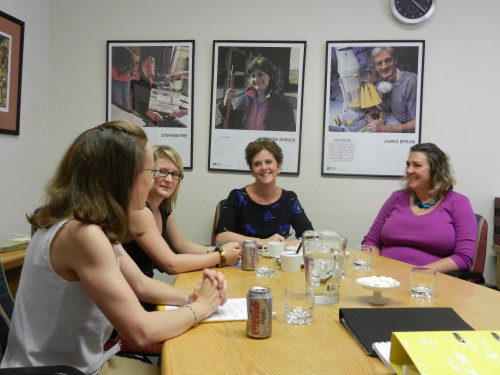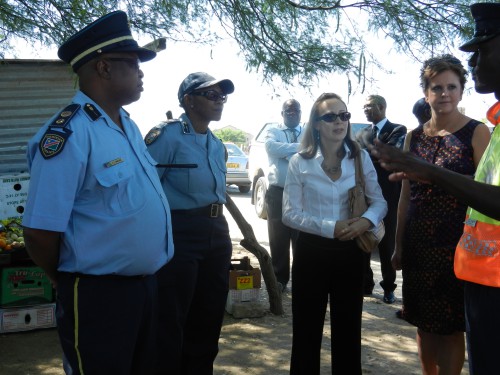13th November 2012 Windhoek, Namibia
British belles on the beat with the Namibian police

It is always a challenge to give official visitors from London a real taste of how a small embassy is delivering results both internally and externally during a lightning visit.
This was the issue faced last week, when the High Commission in Windhoek welcomed the Foreign Office’s Human Resources Director Menna Rawlings, senior Human Resources Manager Jenny York and Stephanie Leggett, who was accompanying them on a short term attachment from our Pay Roll Dept.

Being in charge of FCO Personnel issues, Menna and Jenny were here to see how a Very Small Embassy or Post (VSEP) was working in practice and to look at how I am motivating and managing local staff to help deliver UK objectives in Namibia. Stephanie – as a UK-based civil servant – was keen to see what diplomats got up to abroad more generally and get a taste of Africa on her first visit to the continent.
They were in town for just 24 hours and had spent the first half of the week meeting hundreds of staff in our large South African offices in Pretoria and Johannesburg. We were determined that their Namibian leg would be different and would highlight that you don’t need to be big to be beautiful and deliver great results on the ground.
Their arrival wasn’t auspicious. They were stuck for several hours on the tarmac at Joburg’s OR Tambo airport and then hit bad turbulence en route to Windhoek (a frequent hazard during the hot season here). They arrived looking rather pale.
After a bit of nimble programme-rejigging, all was put back on track again and they were able to get updates direct from local staff on our new ways of inclusive working. Over dinner, they met some of Namibia’s most senior female businesswomen for a relaxed discussion covering broader human resource and local management issues.
The next morning, as part of our plan to get our guests out of offices and to see a bit of Africa, we headed to Windhoek’s main township, Katutura, where we joined officers from the Namibian Police Force (NAMPOL) on the beat to see the results of a new UK-funded community policing project in action.
Katutura lies less than a kilometre to the north of the Namibian capital and is Otjiherero for the place we don’t want to live. It was created in 1961 following the forced removal of Windhoek’s black population from the Old Location site in the city’s centre.
Originally housing less than 10,000 people, it is now a sprawling township housing more than 250,000, over half the capital’s population. It is quite a contrast to Windhoek’s sedate commercial centre and provides a real insight into the country’s social and service delivery challenges.

We were hosted by NAMPOL Chief Inspector Vicky Matjila, who undertook a 3 month community policing leadership training programme at the UK’s elite training academy, the National Policing Improvement Agency in Bramshill last year.
She returned to Namibia to help introduce British community policing practices to Namibia. The model was trialled in Katutura and we were taken around the township by officers to see the effects on the ground. Our first stop was to the notorious Eveline Street, which is packed with shebeens (bars) and has a reputation as a no-go area for the uninitiated.
There were too many bars to count – more than 60 – and many with creative names: Sunshine Delight Bar, Tsunami Bar and Jealous Down Bar – to name a few. Our NAMPOL hosts carefully steered us towards one of the more reputable looking establishments, which was translated into the Mirror Bar.
Being before ten in the morning, the bar wasn’t yet serving alcohol but there was already a dedicated clientele visible outside many of the bars on the street. The clock was clearly ticking down to opening time as the fierce sun rose.
The Mirror Bar’s owner was happy to talk to us. He praised the increased presence of police officers in the area as a result of the community policing initiative. It was helping to curb street crime and drinkers’ behaviour, but he bemoaned that there still weren’t enough officers around during the peak trouble times of Friday and Saturday nights.
The Chief Inspector firmly rebuffed my suggestion (on security grounds) that it might be useful to come back at this time to see the issues in action.

The bar owner confirmed that the number of shebeens in Katutura is increasing all the time – but was confident that he had a loyal customer base to face off competition. Squinting into the various bars from the street, it was hard to tell the difference as they all apparently sold cheap beer (the preferred drink of most) at the same price.
The police have been busy cracking down on unlicensed shebeens in the area but many residents in Katutura still complain that even the legal bars pump out high noise levels day and night and help fuel the community’s high alcoholism and domestic abuse rates.
After stopping at some market stalls to get a lesson on local fruits, we made for a residential area of the township called the Okahandja Park Informal Settlement to get a taste of community policing in action. A NAMPOL community policing officer had been called to a house to break up a fight between the owner’s son and two local youths, who had apparently tried to beat him up.
We arrived in time to find the situation under control – but it soon transpired that the owner was selling a potent local home brew from the building and there was clearly more to the situation than met the eye. It was only when we were updated on the background that I realised Menna was standing at the back of the group next to the alleged attackers.
They weren’t looking particularly happy.
Realising that it probably wouldn’t be a career-enhancing move if the FCO Director of Human Resources got assaulted on my patch, I recommended a few quick photos and swiftly moved the party on.

It was a great field trip for the visitors; both to give them a taste of the impact that a small Post’s project work can have on the ground and to see how UK community engagement methods can be adapted across the world. The scheme has been deemed so successful in reducing crime levels in Katutura that NAMPOL are planning to roll it out nationwide.

So next time we have official visitors, I’ll be able to take them further afield to see the benefits of British assistance on the ground – but will be careful to steer them away from such direct contact with criminals and keep fingers crossed that they have a smoother arrival.
Hi Marianne, good to hear that HMG’s work with NAMPOL on community policing is producing positive results and very refreshing to see official visitors (and yourself as HC) experiencing the other side of Namibian life. Certainly didn’t happen when I was posted there – HCs limited travel for themselves and guests to Windhoek, Swakop and Etosha. Cheers, Nick
Fabulous blog entry Marianne. I love the “you don’t need to be big to be beautiful point” – something that I see from our Pacific Posts where colleagues are often working in difficult conditions. Your blog reminds London folk like me that life in a small Post is almost always colourful and unpredictable. Oh, and it made me laugh. Melanie